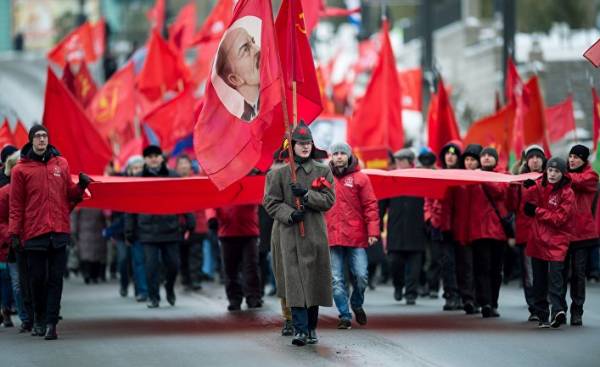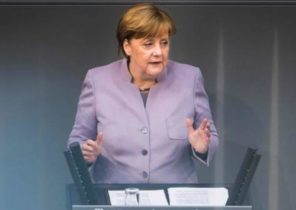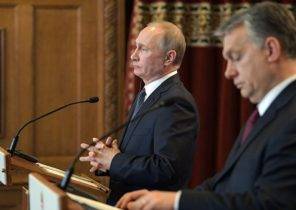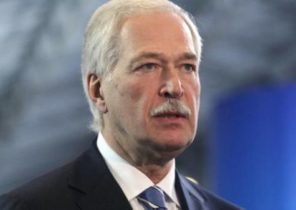
The centenary of the revolution of 1917 put in the uncomfortable position of the Russian authorities, who delighted his world significance, but fundamentally do not accept any idea to overthrow the government. Rare commemorative events should stress the importance of national unity, an antidote to the class struggle. Anyway, informal meetings may depart from this line.
November 7, 2016, on the 99th anniversary of the October revolution, the journalist of radio “Freedom” appealed to Muscovites on the streets with this question: “In 1917 you would support white or red?” Responses demonstrated a slight advantage of the latter, and showed that in Russia the rejection of revolution is not necessarily true of the Bolsheviks, the media project of a new society. Subsequently, the conducted interviews have only confirmed this trend.
On the same day about two thousand nostalgic for communism, young and not so young people took to the streets of the capital with portraits of Lenin and Stalin. The procession was headed by Communist party leader Gennady Zyuganov. Two hours earlier, the leader of the liberal party “Yabloko” Sergei Mitrokhin laid at the Ministry of defense flowers and a plaque in memory of the “defenders of democracy and the Constituent Assembly”. According to him, these people were heroes. They are in arms repulsed “political bandits” (Bolsheviks), which was dissolved in January 1918 favorites 25 November 1917 Constituent Assembly, because they didn’t get it the most votes. Anyway, the Moscow authorities did not agree with the position of the Russian liberals: they periodically ban the activities of “Apple”, but allowed the Communists to go with portraits of Lenin and Stalin. As for Lenin, he still rests (against his will) in the mausoleum on red square and could remain there for a long time. Too great fear that his burial would cause more controversy than the status quo.
These two examples illustrate how many contradictions causes the revolution of 1917 in the Russian society, and how sensitive the issue is for the power of her memory about her. Although with the advent of Vladimir Putin sharply anti-Stalinist views of the era of Boris Yeltsin gave way to a more positive perception of the Soviet leader, both intervals have one thing in common: the categorical rejection of revolutionary upheaval. In 1996 November 7, made the Day of accord and reconciliation. In 2004, the anniversary of the uprising in Petrograd lost the status of official holiday. Finally, in 2005 it was finally pushed into the shadows with the introduction of the Day of national unity on 4 November. This date is associated with the end of foreign invasions (Polish-Lithuanian) in 1612. It is celebrated until 1917 signified the end of the Troubled times and the soon coming of the Romanov dynasty. The abolition of the celebration of the October revolution demonstrates an attempt to erase this event from people’s memory and replace it with another, more conducive to the reconciliation of society.
Reminder “idealists”
Anyway, the anniversary of the storming of the Winter Palace did not completely disappeared. For several years now the Russian authorities conduct the November 7 military parade on red square. We are talking about the anniversary of the revolution, a military parade November 7, 1941 (24-th anniversary of October), when the Nazi forces were on the outskirts of Moscow. Most of the participating 28 thousand soldiers then directly went to the front. Thus, the current government does not want to completely delete this event or to mark it as a revolution. She’s trying to merge into one several historical dates, thereby to form a stronger collective support.
For a long time foreign observers wondered whether the power to celebrate the centennial of the revolution, and if so, how. November 4, 2016, against the background of the ongoing conflict with Ukraine, President Putin and Patriarch Kirill opened in red square a huge monument to Prince Vladimir, the founder of Kievan Rus, which became a state-the cradle of Russian, Ukrainians and Belarusians. The 400th anniversary of the approval of the Romanov dynasty celebrated in 2013. The 200th anniversary of the Patriotic war of 1812 against the Napoleonic troops was the occasion for large celebrations in 2012. Finally, each may 9 held a Grand celebration of the surrender of the Nazis. The last four years, they are accompanied by the immortal regiment March in which several million people are photos participated in the great Patriotic war relatives. All of these activities fit into the logical scheme: the unification and centralization of the Russian state. The revolution also brings to mind the destruction of the state, put Russia on its knees and shed blood in a horrible civil war, which was supported by foreign powers.
A departure from the stability of tradition and the authority of the state — the October revolution embodies everything that he hates power. Political rhetoric carries on the anti imprint. In 2007, Putin’s adviser Vladislav Surkov has reminded all dream of a revolution “idealists”, that “the actions of the romantics to power usually come maniacs and terrorists”.
Under the eye of government, of course, was “colored revolutions”, in particular the events of 2003 in Georgia and 2004 in Ukraine: they were perceived as the results of the maneuvers of the West in post-Soviet space. The protest movement in Russia in 2011-2012 against the election results has stirred up suspicions about interference. To discredit the demonstrators, the government not only talked about work to undermine state sovereignty, but also emphasized the revolutionary (and therefore dangerous) nature of the protests.
During a speech at the session of the UN General Assembly on 28 September 2015, President Putin criticized the “export now so-called “democratic” revolutions. (…) We should all remember the lessons of the past. For example, we remember the examples from the history of the Soviet Union. Export social experiments, attempts to spur changes in those or other countries on the basis of their ideological attitudes, has often led to tragic consequences, has led not to progress but degradation”.
Whatever it is, be silent about the global event simply did not happen. The word “revolution” is already on everyone’s lips. Even Ukraine is preparing for “her” centenary anniversary event, which, no doubt, will be presented as a period of struggle for Ukrainian national independence against asking her Moscow Bolsheviks. In the fall of 2017 all around the world there will be countless on the anniversary seminars, documentaries and publications. Russia will not stay aside. This is evidenced in particular the organization of an international conference with the participation of more than 200 historians (30 of them are coming from Latin America) in September under the auspices of the University, the Institute of world history and the Russian historical society.
The government has been trying to develop its own interpretation of the revolution. Signs of this were visible in 2007 in the history books that were part of the project development of a new Federal training programs. February and October revolutions and the ensuing civil war United them into a single unit under the name “Great Russian revolution”, that clearly shows the desire to put it on a par with the “great French revolution”. It stresses the tragic nature of war and its consequences. Russia came out of this ordeal stronger than before, becoming the Soviet Union. In this scheme there can be no question of blame and the analysis of diverse political views. Both white and Reds were ready to give their lives for Russia: the first Imperial, the second — in the Soviet. Therefore, they both deserve respect.
The expression “Great Russian revolution” appeared even in scientific circles. It allows you to emphasize the importance of this event for the country and the world. In addition, it helps to make the Oct part of a wider process than what do historians after the disappearance of the Soviet “myth” about October, which pushed in the deep shadow of the “bourgeois” February revolution.
In 2015 in Moscow was held a round table chaired by Minister of culture Vladimir Medinsky on the theme “the Centenary of the great Russian revolution: judgment in the name of consolidation” with the participation of representatives of various historical institutions. The event was held in the former Museum of the revolution, which was renamed in 1998 in the State Central Museum of contemporary history of Russia. The name of the open points to the chosen course: anniversary should be an occasion for “consolidation” companies.
“The great Russian revolution of 1917 will forever remain one of the most important events of the twentieth century,” the Minister said at the opening ceremony. In his words, “a comprehensive and objective study of the great Russian revolution and civil war helps us to understand the tragedy of the division of society into warring parties, to understand the importance for Russia of a strong state power supported by all segments of the population.” It was noted the need to emphasize the tragic nature of the division of society after the revolution of 1917 and the civil war with respect for the heroes of both camps (red and white). Finally, the revolutionary terror deserves condemnation in the same way as “the fallacy of betting on the assistance of external allies in the political struggle” (it clearly sounds as a warning in modern Russia).
The present run of commemorative events took place in December 2016, when Vladimir Putin instructed the official of the Russian historical society to form the organizing Committee. “Coming in 2017 — the centenary year of the February and October revolutions, he said. — This is a powerful reason to confront the causes and nature of revolution in Russia. Not only for historians and scientists. Russian society needs an objective, honest, in-depth analysis of these events. This is our common history, you need to treat it with respect.” As noted, the former speaker of the Duma and the head of the Russian historical society Sergei Naryshkin, “the anniversary of an event such as the revolution in Russia needed not for ceremonies, not for celebration, but above all for a deep understanding of the events of a century ago. And most importantly — in order to formulate the most important lessons not only for our country but for the world.” These lessons are primarily “the value of unity, the civil consent, the ability of companies to find a compromise and avoid the extreme split in society in the form of civil war.”
The resistance of historians
Thus, the task of government — to learn the lessons of the revolution. However, judging by the list of events (exhibitions, publications, conferences, research projects, films), which was endorsed by the organizing Committee or would be conducted outside of the official program, on unanimity count still not worth it. Historians will Express their point of view, which is alien to any hoax. The official rhetoric there is a counterweight of scientific, cultural and political circles. So was the case in 2007-2009, when the government tried to impose a positive perception of Stalinism, emphasizing the modernization of the country, which allowed the USSR to win the war. Many publications on the history of Stalinism has not allowed this initiative to succeed.
At this time, many historians will remind us that sometimes muffled by a biased reasoning and calls for the consolidation of society around a strong authority. The fall of tsarism in 1917 and the seizure of power by the Bolsheviks in October were made possible only because the vast majority of the population of the Empire wanted a change and tired of the strongest inequalities in the socio-political system. In addition, interviewed 7 November 2016, the Muscovites, apparently, knew a hundred years later, that belong to the camp of red or white — not the same thing. So, a woman in an elegant fur coat cream color answered that in 1917 her family was impoverished, and she would have supported the Bolsheviks. “Now I, of course, would be for whites”, she added with a dazzling smile.







